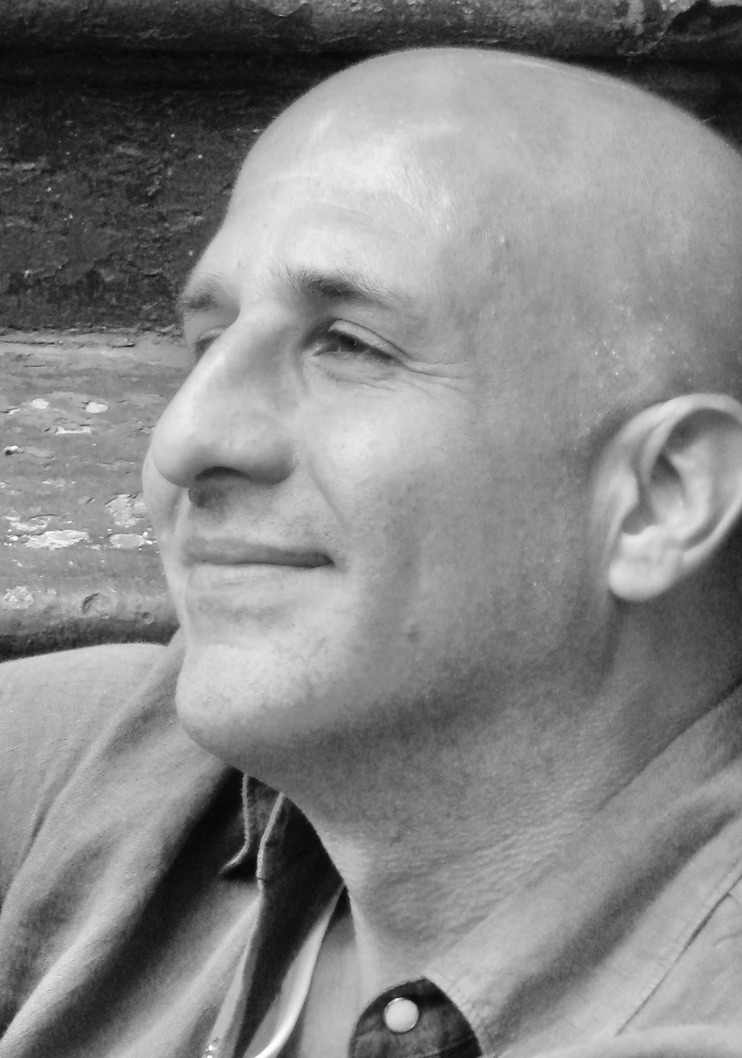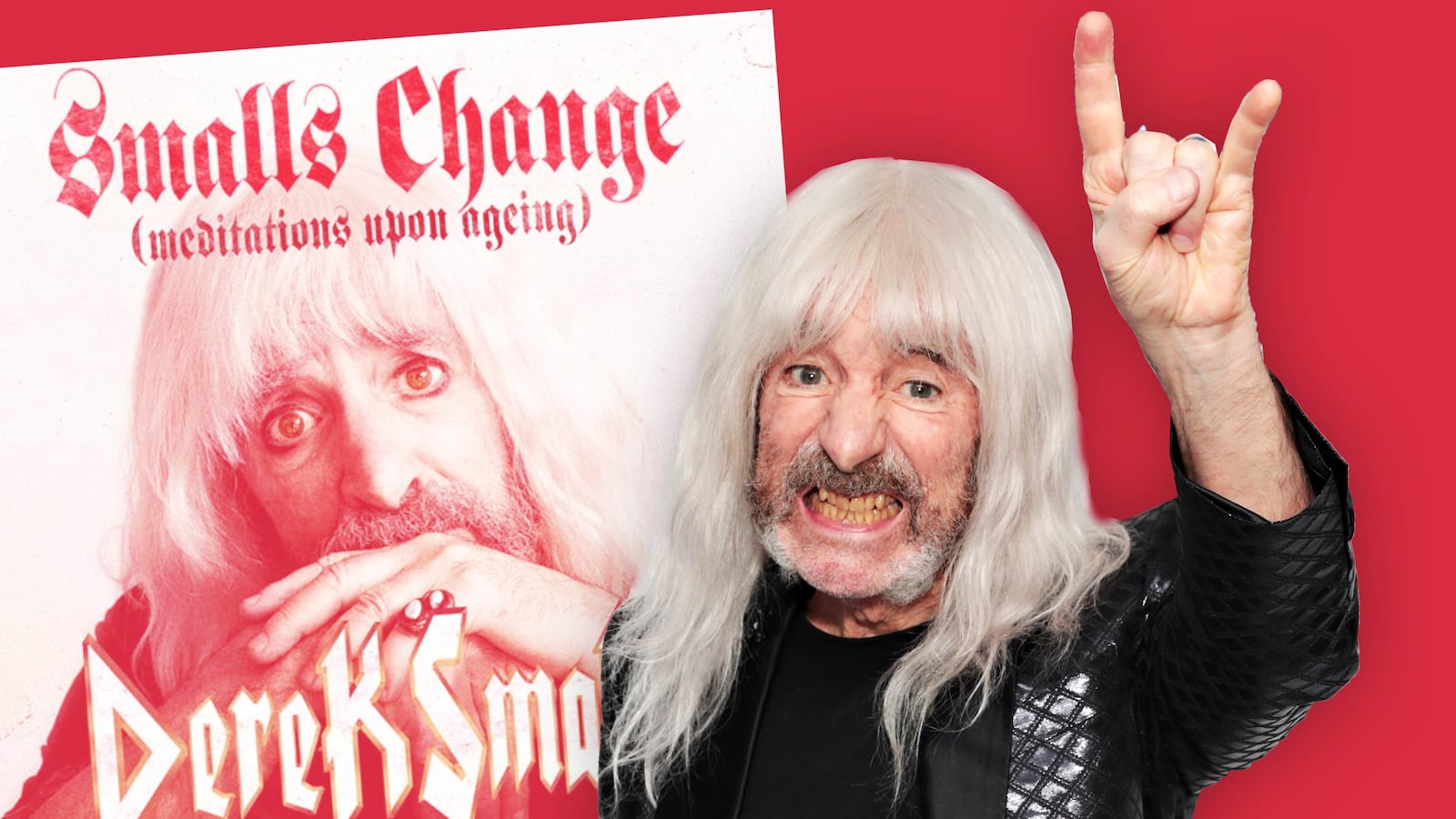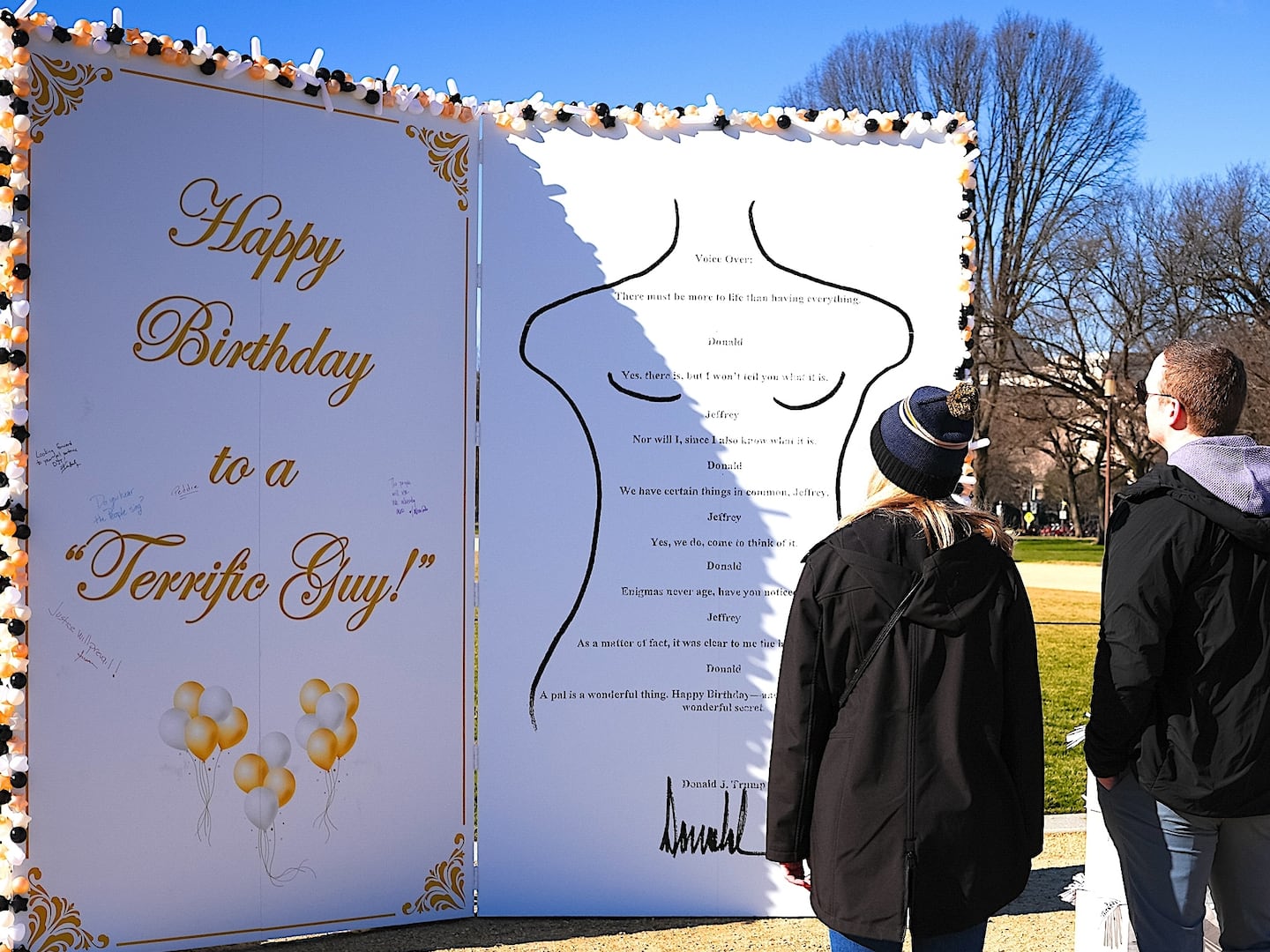More so than Mr. Burns, the animated megalomaniac of Simpson’s fame that bears his voice, or Richard Nixon, the disgraced former president he portrayed with prosthetic nose and chin, actor and comedian Harry Shearer’s most endearing (and perhaps most believable) character through the years has been Derek Smalls, the affably insecure bassist who lent requisite big bottom to Spinal Tap, the band that parodied (and thus, rocked) heavy metal’s sturdy world.
Maybe that’s because Shearer is himself a bassist, singer, and songwriter. Or because rock will never die. Or simply that good satire, like rock, retains its edge. In any case, Derek Smalls has stuck around.
He’s not the same old Derek, the one fans met in the 1984 film This Is Spinal Tap—though the subject at hand is the fact that he is, well, getting old. Once in the shadow of his bandmates, Smalls, now 77, grabs the spotlight with his first-ever solo album, Smalls Change (Meditations Upon Ageing), made possible by a generous grant from the (entirely fictional) British Fund for Ageing Rockers.
Smalls may be without his famous Spinal Tap cohorts David St. Hubbins and Nigel Tufnel, but he’s surrounded by A-list players on an album that is both cleverly self-mocking and genuinely hard-rocking. He blends winks and nods with rock’s arch-serious stare. His music still has the cranked-up adolescent sound, yet his lyrics reflect the crankiness of senior citizenship. Smalls sets the bar high here for both pomposity and musicianship, and he delivers on both fronts. Joe Satriani lends his searing sound to the album’s closer, the nine-minute-plus opus “When Men Did Rock.” Steve Vai solos colorfully on “Gummin’ the Gash," which reveals one upside to growing older. Donald Fagen sings on “Memo to Willie,” which repurposes a Steely Dan lyric to consider erectile dysfunction. Along the way, musicians including David Crosby, Paul Shaffer, Dweezil Zappa, and Rick Wakeman—close friends and “those who took pity,” Smalls says—pitch in. In an effort to achieve “grandeur on top of grandeur,” several tracks include the Hungarian Studio Orchestra.
When Smalls debuted this music live in New Orleans, he arrived on a special mobility scooter, his unruly long hair now fully white. He’d lost none of Spinal Tap’s flair for stagecraft. He had the Louisiana Philharmonic Orchestra in tow, special guests via video; he cut to a live satellite feed of Stonehenge as he reprised the Spinal Tap song named for that ancient wonder.
When I called him one morning not long after that show, he talked about both the joys and pains—“the Prozac and the cons”—of aging, the durability of rock and the grant-application process.
Derek, how did the New Orleans premiere go?
The orchestra seemed almost delighted to bid farewell to Bartok and Beethoven and embrace something a bit more modern and a bit more crass, in the best sense. We had some New Orleans musicians as special guests because you have to tip your hat or some garment to the musical culture of that place. At the end, we had ten sousaphone players from New Orleans brass bands come onstage because “Big Bottom” just didn’t seem big enough with just the orchestra and band.
Why did you want to want to work with an orchestra?
Rock has a wonderful but limited palette. You amplify guitars and basses and drums and maybe a keyboard or so, and that’s about it. If you want to really add colors you have to go in a different direction. You could get a gamelan together, I suppose. This music goes the entire journey, from really basic in-your-face rock to the most ultimate grandiosity of the ’70s. You need an orchestra to express that kind of marvelous pomposity.
Yet you’re still to the bone a rock musician, right?
A rocker at heart, but with my eyes to the skies.
That makes me think of your new song, “When Men Did Rock.” There’s a couplet of yours: “A time when all believed and none would mock/ There was a time when men did rock.” Is that over, are you lamenting that?
It’s not a lament. It’s not a linament, either. It’s an expression of regard for a time that seems to have passed. Do I lament that the Knights of the Round table aren’t here anymore? No, I just noticed that they’re gone. It’s worth remembering. It might make people of a certain age a bit wistful. Wistful is good. We are in a different day now. There’s a lot more so-called music made with computers and people who have Auto-tuned their vocals.
In the past, you’ve called yourself lukewarm water, in between the fire and ice of your Spinal Tap partners. Has your temperature now changed? Has your chemical state changed?
Those are interesting questions. You know, playing back there as bass player in a rock band, never going to the center mike except for a couple of songs, I can now realize that lights upon the center mike are brighter. And we know from studying physics that light equals heat. So it’s warmer up there. Now that I’m at that center position as a solo artist, that lukewarm water is getting a bit more tepid.
What inspired this album in the first place?
Well, Spinal Tap had dissolved for apparently the last time.
You guys seem expert at dissolving…
It’s almost our best trick.
Anyway, I’d gone to Amsterdam to do some television and then I found myself rooming with a mate, Eddie Dreggs, in a near-death metal band called Chainsaw Vermin. His bass player abuses all known substances so I’d been called to fill in. I thought myself, Derek, is this how it ends: As the fill-in bass player for Chainsaw Vermin? Not the most captivating thought. At that point, I’d noticed an advert for a quasi-governmental organization in Britain called the Fund for Ageing Rockers and they were giving grants. I applied and they said, “Great, what’s your idea?” I said, “My idea is that you give me money and I make a record.” And they said, “No, an idea, an idea…” They said it twice like it meant more that way. So I said, “OK. I’ll write what I know about. I know I’m getting older. So I’m basically back because there is a vacuum in my life and, I hope, in the lives of others since Spinal Tap is gone. I’m trying to fill that much-needed hole.
Is this a public service?
It is for them. This is apparently the money left over from austerity. So it’s their way of giving back.
Is this album an attempt to change Derek Smalls’ image?
This is exactly who I am, musically. The only thing left out of this record was that I’m known for blazing a bit of a trail with my experimental improvised musical excursion called “Jazz Odyssey,” which I think is a bit too out there. It was two chords. It confined the improvisational instincts of my partners. Now I’ve come up with a musical incursion, “Jazz Iliad.” We didn’t have time for that here. It’s about 48 minutes. Aside from that, everything I am musically is quite there for all to see.
I thought jazz guys want to play more chords?
The jazz guys, yes, but the rock guys who play jazz just want to play more notes.
Eventually, could you achieve an ultimate improvised moment with no chords?
That would be the goal state. It would be a drone, wouldn’t it? We haven’t heard it yet. You know, it may be a sound that only comes from machines in which case it would be an unmanned drone.
On Smalls Change, you’re surrounded by a lineup of household names. Are these just friends you’ve accumulated through the years or cold calls?
I’d say that there was a great, almost overpowering, sense of warmth and generosity after the repeated calls and the many requests to please return them. Rick Wakeman once said, “Oh sure, it’s like a pity fuck.” To me that was a great compliment because I’ve been on the other side of that, you know.
Did you find that these guys got your particular brand of music?
Oh, yes. For instance, we brought David Crosby in to do “Gimme Some (More) Money”. It’s basically a song about how you start your career busking in the street on the pavement with a hat in front—“hand over a dollar, please”—and then you get signed to a record company that robs you blind, and then you say, oh the record business is gone now, sorry, you missed it. So at the tail end of that journey, might as well put out the hat again. I didn’t know if Mr. Crosby could identify. My producer asked him, “How’s that boat of yours?” And he said, “I had to sell that boat!” So we know that he could identify the proper feeling.
At the end of the song, “Memo to Willie” Donald Fagen sings, “Willie don’t lose that lumber…” Was that meant as ironic?
That was the reason we called Mr. Fagen in the first place. At the end of the bridge I sang, “Willie don’t lose that lumber.” I thought, blimey, he’s gonna sue us. So I wrote to Mr. Fagen. I said two things: Don’t sue us. And would you sing on it, please? I don’t know about the suing part, but we got him to sing.
Were you a Steely Dan fan?
I would describe their music as delightfully arcane. I don’t know what that means, however.
They had references in lyrics that girlfriends would have to explain to me. I did get the reference about the name of the band, which I liked. Anytime you name your band after a dildo, I think you’re ahead of the game.
On “Memo to Willie” you’re addressing one of the downsides, quite literally, of aging: A man’s staying power. Is that a pressing concern?
The subject matter in “Memo to Willie”—that’s not based on my experience, God knows. But I’ve been over to the States many times and you turn on the telly and you see these adverts with nice-looking blokes maybe in their forties and they’re out with a nice-looking piece of crumpet and they’re rowing in a canoe or hiking in woods or bicycling. You think, Wow, they’re going to get it on. And all of a sudden, a voice comes on the soundtrack, “When the time comes, will he be ready?” And you think, is this an epidemic? Is this like Mad Cow for down below? I thought, you don’t have to take a pill, just give Willie a stern talking to.
On a related note, I’m sure you’ve been asked about that scene in the Spinal Tap movie in an airport, where you set off security alarms because of a zucchini wrapped in aluminum foil and stuffed down your pants. Why did you feel the need to do that at that time?
It was at that time. I didn’t do it before or since. This was our first American tour. We were playing larger houses than we’d ever played before. I never had a problem with, as we call it in the business, my power stance. But I said to myself, These are bigger houses than you’ve ever played. Stage fright might have a damaging effect on the desired appearance. Why not take out a bit of an insurance policy? That’s all that was. It was all about making a good impression.
Are you saying that you’ve had no further need for zucchini?
Not even for dietary purposes, but certainly not for trousers. I’ve banished the entire produce department from my trousers.
Are you surprised that American listeners still have a place in their hearts for you?
I’m grateful that in the welter of all the noise and all the music that has come in our wake that there’s still room for old Derek. And I intend to repay that with the grandest possible musical expression that has ever been conceived by the mind of man.






